Let’s embark on a cerebral journey that defies the boundaries of the flesh and ventures into the labyrinth of the mind. Imagine you could take a magical elixir that rejuvenates your brain, replenishes your mental agility, and sharpens your wits. No, this isn’t the subplot of a science fiction novel; it’s the tantalizing prospect of exercise and its profound impact on our brain cells.
In the realm of neuroscience, a groundbreaking revelation is changing the way we perceive physical training: it’s not just about sculpting a chiseled physique or escalating your endurance. Regular physical activity has the astonishing ability to foster neurogenesis – the creation of new neurons in the adult brain, specifically in the hippocampus, a region vital for learning and memory.
For decades, the common belief held that adults were doomed to a steady decline in the number of brain cells as they aged. Yet, modern research is shattering this misconception with evidence that adults can indeed generate new brain cells irrespective of their age. While this seems like a recently uncovered secret, historical anecdotes hint that ancient civilizations might have intuitively perceived the connection between physical vigor and mental acuity.
Now, let’s dive deeper and unravel this fascinating phenomenon. Exercise catalyzes the release of a symphony of biochemical substances, including growth factors like Brain-Derived Neurotrophic Factor (BDNF). BDNF acts like fertilizer for the brain, nurturing the growth and survival of neurons and fostering synaptic plasticity – the ability of synapses to strengthen or weaken over time, crucial for learning and memory.
Moreover, physical activity improves cerebral blood flow, delivering a boost of oxygen and nutrients that fortify brain cells and shield them from damage. It’s akin to watering a plant, ensuring it not only survives but thrives under optimal conditions.
But it’s not just about the birth of new brain cells; it’s also about the connections between them. Exercise influences the intricacy of dendritic arbors, the brain’s communication channels. Simply put, the dendrites are the branches through which neurons converse, and physical activity can make these conversations both richer and more complex.
The prescription for this cerebral renovation isn’t as daunting as it may seem. Research suggests moderate intensity aerobic exercise, like brisk walking or cycling, for at least 150 minutes per week or vigorous-intensity activities like running for 75 minutes per week, coupled with muscle-strengthening activities on two or more days a week, can put you on the path to cognitive enhancements.
But what exercises are best? While cardiovascular exercises get your heart pumping and your neurons firing, don’t underestimate the power of resistance training. Lifting weights or engaging in body-weight exercises not only builds muscle but has also been shown to improve executive function – the command center for your cognitive operations like planning, focusing, and multitasking.
And let’s not overlook mind-body activities such as yoga or tai chi, which bridge the gap between physical exertion and mental tranquility. These practices are certainly not just fancy stretching routines; they invoke a calming yet focused mental state, believed to also contribute to synaptic prowess.
Let’s puncture a popular myth while we’re addressing the wonders of exercise. You might have heard that only the young and spry can reap the brain-enhancing benefits of exercise. Not true. Studies indicate that individuals, even in their senior years, can spur brain cell growth. It’s never too late to begin; the brain remains responsive and malleable, waiting for the rallying call of physical exertion to jump-start its cellular factories.
What’s more, scientists observe that exercise not only catalyzes the creation of new neurons but also paves the way for these nascent cells to integrate into existing brain networks, crucial for the enrichment of mental functions. It isn’t just about generating new brain cells; it’s about effectively assimilating them into the fabric of our neural landscape.
But before you rush off to the nearest gym or lace up your running shoes, consider the key to unlocking the full potential of this wondrous biological process – consistency. Just like an artist painstakingly adds brushstrokes to complete a masterpiece, you too must continually nurture your brain with consistent physical activity to see the grand picture of cognitive enhancement emerge.
This isn’t just a call to action for the individuals eager to hone their mental edge. The implications of exercise-induced brain cell renewal extend to the realm of mental health, providing a beacon of hope for those battling conditions such as depression or anxiety. Our traditional understanding of mental health treatment is experiencing a paradigm shift as we consider how physical exercise might not only alleviate symptoms but also address some underlying biological causes.
In a world brimming with smart drugs and cognitive enhancers, it’s crucial to remember that we possess an innate power to bolster our brain’s vitality. Exercise is the universal prescription written in our biology, accessible and potent. So, dare to redefine your workout routine, not merely as a quest for a lithe physique but as an investment in the most exquisite organ in the body – the human brain.
Embrace the physical journey with a newfound appreciation for its cerebral dividends, understanding that each drop of sweat is a testament to the resilience and plasticity of your brain. Cultivate a lifestyle that interweaves physical vigor with mental sharpness, and witness a personal renaissance that transcends muscle, reaching deep into the sinews of your very neurons.



